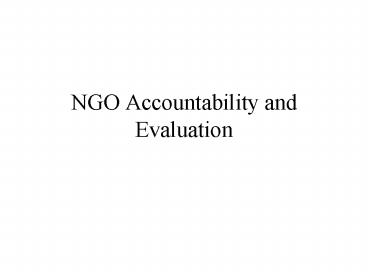NGO Accountability and Evaluation - PowerPoint PPT Presentation
1 / 16
Title:
NGO Accountability and Evaluation
Description:
Answerability to those in higher authorities. Holding actors responsible for ... Freidrich (1935) and Finer (1941) Debate. Freidrich: Internal accountability ... – PowerPoint PPT presentation
Number of Views:563
Avg rating:3.0/5.0
Title: NGO Accountability and Evaluation
1
NGO Accountability and Evaluation
2
Why Accountability Now?
- Growing dependence on public money
- Favored child of official aid system
- Growing visibility and influence
- Tightening resources
- Growing advocacy activities
- Beyond the magic bullet mindset
- Freer climate post Cold War
- Practicing what NGO preaches
3
Accountability
- Answerability to those in higher authorities
- Holding actors responsible for their actions
- Responsible for ones actions
- Answering to stakeholders (LB) for the results
and impact of performance - Stakeholders directly or indirectly affected by
projects
4
Classification of Stakeholders
- Patrons official funding agencies, international
and bilateral donors, and host governments. - Clients local NGOs, partner organizations,
grassroots organizations, beneficiaries, and, in
its broadest sense, the community. - Peers fellow NGOs and affiliate members
- Themselves board, volunteers, staff
5
Verification of Accountability
- Freidrich (1935) and Finer (1941) Debate
- Freidrich Internal accountability
- Limitations of external accountability methods
- Imposing requirements and rules on organization
- Emphasizes internal accountability self-control
- Finer External accountability
- Subject to abuse of power
- Marginalized population
- Importance of external control
6
Multiple Dimensions of Accountability
- Hierarchical/Bureaucratic Accountability
- Based on a popular notion of Weberian bureaucracy
- close supervision for compliance with directives
- Formal rules and procedures
- as an instrument of organizational and managerial
control - Annual review and written report
7
Legal Accountability
- carry out tasks in accordance with constitutional
principles, laws or contractual obligations - Emphasize oversight and monitoring by external
parties - Legally binding behaviors
- Authorized by law to work on behalf of official
funding agencies - Donor requirements
8
Political Accountability
- Central to democratic process
- Emphasizes responsiveness to constituents needs
- Satisfaction of key stakeholders
- Verified through the ballot box
- NGO advocacy activities
- Do NGOs possess legitimacy to act on behalf of
marginalized population?
9
Professional Accountability
- Emphasizes individual responsibility and internal
accountability mechanisms - Relies less on formal oversight
- on professionalism and professional standard
- Peer review process
- Self-monitor and regulation
- Expertise of NGO workers
- Humanitarian code
10
Moral and Ethical Accountability
- Internally based
- Based on the commitment to do the right thing
- Moral and ethical obligations to act and make
decisions in the interest of marginalized
population and the public - Standards of good behavior arise from conscience
- concerns for the general welfare
- Altruistic drive
11
Current Theories of NGO Accountability
- Multidimensional Accountability
- Each dimension of accountability
- Is suitable to each group of stakeholders
- Patron
- Peers
- Themselves
- Clients
12
Multidirectional Accountability
- Alan Fowler
- Long chain of resource flow, multiple objectives,
demands, multiple institutions, sectors - Respond to different requests
- Top down and bottom up
- Dictated by context advocacy, emergency, or
development activities - Complication of the international aid system
13
Upward vs. Downward Accountability
- By Michael Edwards and David Hulmes
- Two directions of NGO accountability
- Based on ability to impose sanction and
performance impact - Upward accountability to patrons
- Downward accountability to clients
- Overaccountability vs. underaccountability
14
Contingency Theory
- By David Brown and Julie Fisher
- INGO accountability is not a fixed notion
- Operates in a much more dynamic environment
- Different kinds of information and feedback are
needed for different audiences - contingent upon both the demander and the context
of the demand - Donors formal requirements, standardized
15
Accountability vs. Evaluation
- Accountability broader concept
- Accountability strengthening performance
- Evaluation and monitoring mechanisms to generate
data - Participatory evaluation
- Benchmarking
- Difficulties in evaluation work
- Organizational learning
16
Managerial Challenges
- Time
- Money
- Resources
- Apparent results vs. long-term impact
- Measurable objective NGO goals
- Accessibility
- Whose indicators to use?































